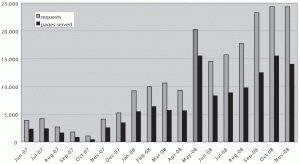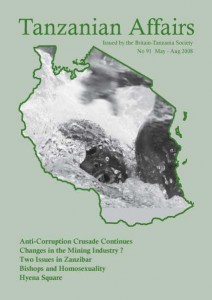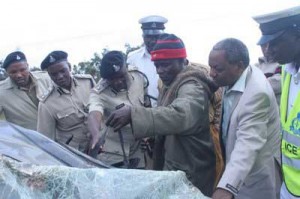Edited by John Cooper-Poole (UK) and Marion Doro (USA)
Suggestions from readers about items for future review are always welcome.
ENDING AID DEPENDENCE. Yash Tandon, Fahamu Books, 2008
133 pages, ISBN978-1-906387-29-7. £7.99. paperback.
The global financial crisis and predictions of imminent capitalist collapse possibly brought a smile to the face of Yash Tandon, director of leftist think-tank, South Centre, and author of this book.
In ‘Ending Aid Dependence’ Dr. Tandon develops his well-rehearsed arguments from earlier works and continues his tirade against the West, IMF, World Bank and various UN agencies perceiving them as neo-colonialist and neo-imperialist bent on perpetuating economic dependence and perverting the political independence of the developing nations of ‘the South’.
In wishing to provoke a global dialogue whose laudable purpose would be to work towards an end to the unsatisfactory reliance on aid of so many impoverished nations of the South, it is a pity that for half the length of his book Dr. Tandon bites the (only) hand that feeds them.
He does make reasonable points – for example it is unconscionable that after nearly half a century of independence and despite billions of dollars of investment by the West and the institutions reviled by Dr. Tandon, many nations remain underdeveloped and penurious; true too that promises made by donors at high-profile international conferences are often diluted or put aside. He observes that much aid seems primarily to serve the ‘charity industry’ for its own benefit and continuing survival.
Unfortunately, he glosses over the endemic corruption and disreputable governance affecting nearly two-thirds of the South countries today, and unrealistically suggests as alternatives the immediate post-independence policies of Nkrumah’s Ghana or Nyerere’s Tanzania whose failed socio-economic experiments inflicted so much misery. Such naivety is apparent too in that despite past chronic misuse, Dr. Tandon feels that aid, unlike most lender/borrower relationships, should be donated without terms and conditions.
In this ultimately unsatisfactory book, Dr. Tandon offers few if any practical solutions, only discussion and the development of (yet more) strategy. The South nations can only become free of aid if and when they offer their peoples conditions for economic, social and financial progress backed by incorrupt institutions and the rule of law. Until then, with unconditional assistance unlikely to emanate from any other source, the West and its institutions, however imperfect or self-serving, remain the South’s only source of succour without which the situation would be even worse. The end to aid reliance unfortunately remains a distant dream and any smile can be only fleeting.
Roger Payne 2008.
The two following abstracts of papers likely to be of interest to readers were kindly sent by Professor Pat Caplan:
‘BETWEEN SOCIALISM AND NEO-LIBERALISM: MAFIA ISLAND, TANZANIA, 1965-2004’. Review of African Political Economy, special issue on ‘Class, Resistance and Social Transformation’, no. 114, 2007, pp. 679-694 By Pat Caplan, Goldsmiths College, London
This paper considers issues of equality and inequality in Tanzania with particular reference to Mafia Island over a period of forty years. It begins by examining an apparently paradoxical situation: in the recent period of neo-liberal economics, during which Tanzania has won plaudits from multilateral agencies for its economic policies, many ordinary people on Mafia consider that their well-being has actually decreased and that
social differentials have vastly increased: wengine wanapata, wengine hawapati (some get, others don’t).
The paper seeks to consider some reasons for this situation by considering the relation between state (and local state), political party(ies) and citizens, and the changes and continuities in these relations over four
decades. This also involves an examination of the role of donors (wafadhili) and NGOs, on the one hand, and developers (wawekezaji) on the other. It is shown that the discourse in which issues of development are
discussed contains both continuities with earlier periods, as well as changes.
The paper also examines people’s perceptions of equality, inequality and poverty, with particular emphasis on the comparisons made between their own lot and that of others, as well as their views of their entitlements.
It concludes with case studies of two villages on Mafia: Kanga in the north, which has remained relatively isolated and poor, and Chole in the south, where tourist development has taken place.
‘BUT THE COAST, OF COURSE, IS QUITE DIFFERENT’: ACADEMIC AND LOCAL: IDEAS ABOUT THE EAST AFRICA LITTORAL. Journal of Eastern African Studies vol.1 no. 2. 305-320. July. 2007 by Pat Caplan, Goldsmiths College London
This paper examines identity and history on the coast of East Africa, an area long thought to be different from its hinterland in many respects, including the absence of ‘tribes’. It discusses the apparent paradox of
recent calls by intellectuals of East Africa coastal origin for the Waswahili to be termed a ‘tribe’. In the first section, I consider the arguments of those who have maintained that the Waswahili are not a single people, and in the second discuss those who have argued the opposite. The third section considers some of the reasons for the differences, including historiography, identity politics, and the positionality of both authors and informants.
THE ECONOMIC IMPACT OF HIV/AIDS IN AFRICA: A COUNTRY STUDY. Mandy Siebold, Saarbrücken, VDM Verlag Dr Müller, 2008. pp.101. ISBN 978-3-8364-6308-9. Received as a pdf document.
This book explores the current and potential impact of HIV and AIDS on the economy in Tanzania. Based on a review of existing literature, it argues that the disease represents an economic crisis because it targets the economically-productive groups in society. The first section of the book provides a general survey of HIV and AIDS, and Tanzania. The second part takes a more detailed look at the impact on key areas of the economy: the workforce; the macro-economy; particular sectors such as the formal, education, agricultural and public sectors; and how the disease affects households, women and children.
Whilst the book does provide a wide-ranging survey, its main weakness is reliance on data that is already out of date. This reduces the usefulness of the book, as the data cannot be relied upon to reflect the current situation. For example, on page 19, the book asserts that there are 42 million people globally living with HIV and AIDS. However, the latest estimate from UNAIDS is that there are 32.5 million people living with HIV and AIDS. Similarly, estimates of the number of children orphaned are out of date (and the assertion that a large proportion live without family support of any kind is not supported by current research). Numbers currently receiving anti-retroviral treatment have expanded dramatically over the past two-three years with the implementation of programmes by the Global Fund, the Gates and Clinton Foundations and US funding. Ultimately, these weaknesses undermine the usefulness of the book as a key text in understanding how HIV and AIDS is affecting Tanzania’s economy, society and politics.
Michael Jennings
MIOMBO, Newsletters of the Wildlife Conservation Society of Tanzania, Numbers 31 and 32. The Society, Dar es Salaam, 2008. 20 pages each issue. Free to members of WCST.
Quite apart from the knowledge that one’s subscription is helping the WCST’s admirable cause, one splendid advantage of membership of the body is to receive two issues of the Society’s Newsletter each year. The issues for 2008 were, as usual, excellent.
Number 31, datelined April, contained, as major features, a summary of WCST’s conservation projects under implementation; a survey of the rare warbler, Karamoja Apalis, in the Serengeti ecosystem; an article querying whether the water flow from the Eastern Arc Mountains is declining; an excellent piece on Tanzania’s endangered marine turtles; the discovery of a new Shrew species in the south centre of the country; and pictures of a Parliamentary Committee visit to Lake Natron. Natron is the lake, north-west of Arusha that is the subject of heated debate: bird conservation vs soda ash extraction on an industrial scale.
Number 32, datelined November, continues the Lake Natron theme with a detailed update on that ongoing saga as well as offering a well-researched article on Peafowls in Dar; a fascinating piece on the threat to Tanzania’s biodiversity from invasive alien trees and plants; and features on the distribution of the wild dog, climate change and environmental education.
The WCST is a wonderful organisation and always needs new members. They can be contacted at wcst@africaonline.co.tz. The newsletters on a whole range of flora and fauna topics are worth the annual cost of membership alone!
David Kelly
WORLD LEAGUE GUIDE, covering the ICC World Cricket League Division 4 tournament, held in Tanzania 4-11 October, 2008. 4-page leaflet, published by ICC (International Cricket Council).
A small, but unusual, literary offering, essentially a souvenir programme for the matches held in Dar es Salaam, a significant landmark in the history of Tanzanian cricket. The tournament involved teams from Afghanistan (the eventual winners), Fiji, Hong Kong, Italy, Jersey and Tanzania. There are welcome messages from the President of the ICC and from Zully Rehemtulla, the Chairman of the Tanzania Cricket Association; some useful facts about all the contesting countries; the tournament programme itself; a summary of the global structure of the ICC World League (for countries outside the Test arena); and a picture of the Tanzania squad.
David Kelly
KEEPING SOMETHING ALIVE. Glyn Roberts and Mark Smith. ISBN 978-1-906274-07-8. Brill Books 2008. paperback. 128 pages. £7.50 inc. p & p. Available from Tools for Self reliance, Netley Marsh, Southampton SO40 7GY. Tel: 023 8086 9697. Email: info@tfsr.org.
This is the story, written by two of its founding members, of Tools for Self Reliance from its start in 1978 up to 1995. The idea of collecting unwanted tools and refurbishing them for the use of craftsmen in Tanzania, was one which quickly caught on, with over sixty support groups in Britain, and tools being sent to a number of countries. As well as providing much needed tools, the organisation seems to have served as a conduit for the enthusiasm of many supporters of Mwalimu’s policy of African Socialism and radical movements generally.
In its early days the organisation worked as a cooperative, everything being decided democratically, but it soon became apparent that a more structured arrangement was needed to meet the needs of a rapidly growing organisation. Clearer lines of authority, formal links between support groups, headquarters, and distributors had to be devised, not without much soul searching. There is surely the basis here for several worthwhile business school dissertations on organisational development.
There is useful information about the number of tools supplied, but more about finance and personnel numbers would enable the reader better to compare inputs with outputs, which on the basis of the information given appear to have been rather poorly related.
The shortcomings of the organisation are fairly discussed, particularly the difficulty, shared by many (most?) donors, of assessing their effectiveness.
Small though it is, this book is thought provoking and likely to interest anyone who is, or has been, involved in aid projects of whatever size. Given the ethos of the organisation it is no surprise that profits from the book will go to the organisation, rather than the authors. Very good value, and much to interest, at the price, particularly as a DVD is included.
J. C-P.
RAISE YOUR VOICES AND KILL YOUR ANIMALS. Islamic Discourses on the Idd el-Haj and sacrifices in Tanga, Tanzania. Authoritative Texts, Ritual Practices and Social Identities. Gerard Cornelius van de Bruinhorst, 2007. Doctoral thesis, Utrecht University.
The book text can be downloaded at http://igitur-archive.library.uu.nl/dissertations/2007-0907-200459/index.htm
The Islamic Sacrificial Feast, one of the two major Muslim annual festivals and coinciding with the pilgrimage to Mecca, has long been neglected as a static, canonical ritual determined by centuries old, Arabic texts. This study based on extensive fieldwork and many written documents illustrates how the ‘orthodox’ Idd el-Hajj (as the feast is called in Tanzania) shows many different faces. The basic elements of the ritual shared by all Muslims and corroborated by authoritative texts are a communal prayer, a sermon and an animal sacrifice. The ritual reflects the influence of these authoritative texts but the interpretations of these scriptures are continuously reworked in order to reconceptualise Muslim identity in a changing social and political context. Although all Muslim groups in Tanzania accept the idea that Islam is embodied in a set of basic texts, the legitimacy of these texts and their applicability to particular situations is continually challenged and contested.
The discussions on the correct ritual practice are influenced by new developments like the vernacularisation of Islamic key texts and an exceptionally high literacy in Swahili which enables a large part of urban Muslim population to participate in these discourses on Islam and Islamic ritual. This study especially illustrates the ideas on time and place of the Idd el-Hajj. Differences in the date of the festival are connected to the problems of moonsighting: the lunar month only starts with the first sighting of the crescent but the validity of a sighting is not accepted by all Tanzanian Muslims. The personal authority of a religious leader, the loyalty to a local madrasa (Qur’an school) or the desire to synchronise the Idd with the ritual performance of the whole nation or with the activities of the pilgrims at Mecca results in different holidays.
Secondly, the notion of place in the Idd el-Hajj performance is very important because of the link with the hajj: the annual pilgrimage to the sacred heart of Islam. Different conceptions of the religious and social importance of the hajj are reflected in the way Tanzanian Muslims perceive the role of Islam in their society. This is furthermore reflected in the place where each community performs its Idd prayers: inside the mosque or on public prayerfields. Also the significance of animal sacrifice changes according to the place where it is performed: in the private sphere of the house, on the public field in the centre of the town or in the state controlled abattoir.
The major point of this study is that in the particular forms of the Idd el-Hajj Muslim groups redefine their position within a field of different loyalties and identities and in this process continually reconstruct a Muslim moral community. These different identities are not necessarily contradictory or mutually exclusive. Sometimes the social significance of the ritual is primarily that of a family happening, sometimes the ritual is important to express the identity of a particular madrasa or mosque. But the two most important moral communities visible in the discourses and practices of the Idd el-Hajj are the Tanzanian nation state and the global Muslim community. Tensions between the daily reality of a Muslim minority living in a secular state and the ideal image of a unified Muslim community exemplified by the hajj are at the heart of these discourses.



